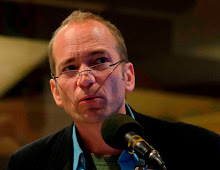In a Landscape: XXVII
“There are flowers in the dirt
and there’s dirt in your eyes,” as the saying goes
that I just made up. Is this what thinking is like? I’ve been thinking
for 44 years or so, and I’m not sure. Most thinking
doesn’t resolve—and most thinking is laid over the top
of other thinking—and thinking is fairly continuous—
all process—“It’s all one song,” as Neil Young says. In that way
most thinking is like most lives, accruing by accident,
irresolvable. It’s why we’re said to come back as ghosts, right?
I’ve always had a hard time with people just sitting
there not saying anything. If people aren’t talking
then I have to guess what they’re thinking
and I always guess something like, “this guy
talking to me sure is an idiot.” So, over the years,
I’ve tended to stay far away from such people. I imagine them all
in a room somewhere, quietly, with their private thoughts. And then
comes the inevitable question about where
this thinking is leading us, where we’re getting to, and all these ideas
of going somewhere, as if there were anywhere
to get to with a little bouquet of flowers on it, when mostly
our thinking out loud is just us being friendly.
The other day Natalie (I’m putting this in a year later. She’s
nine now) said to Robin, “Did you see that? There was just a man
standing by the couch in a suit.” And no, Robin
hadn’t seen anything. A few days before, I was walking down the hall
and somehow the papers I was carrying shifted in my hand
as if someone were behind me, giving them a little tug. Robin says
the kitchen cabinets sometimes open and close in the night,
and the other day a plate fell off the shelf into the kitchen sink. So,
with that, Halloween is over. We’re coming up on the
holiday season. For Natalie and Eliot, as they’re children,
that’s a place to get to. Still, I’m not dreading it. The sun’s
coming out. It’ll get to 70 today. How you can look
at the weather sometimes and it can appear to be washing away
the past. How in high school I played clarinet. Second chair.
In a Landscape: XXIX
“The idea just came to me one day,” or, better,
“It just dawned on me.” Either way, we’re all admonished
to beware our tendencies, as apparently tendencies
tend to wind us down or blind us to better things our tendencies keep us
from noticing—I imagine that becoming a tendency
so that potentially all tendencies aren’t bad
just as all goals aren’t good. We could go round
saying, “it continued to dawn on me,” or
“I have a tendency to dawn on me.”
I remember something like that from High School,
where we were in our goal-setting class, and the teacher kept telling us
not to let our lives go by without setting goals, and I asked him,
what if the goals aren’t good ones, like to hurt people
or to do bad things, might it not have been better
not to have goals? I don’t remember what happened
after that. Nothing much, I’m certain, but he did talk about
brushing teeth next, how he was always told to brush up and down,
and he did that religiously for years, and now (this was
1982 or 1983) his gums were receding—so we shouldn’t
brush that way, we should brush
in circles. Maybe that could be a goal even.
“Why not be straightforward,” we always say
back and forth, but once we get past “pass the salt,”
things get confused with where are we going
and what are we doing. What are the relevant
and irrelevant bits, when most people
make up mostly what they think people
are trying to say to them, and they’re usually right enough
for communication to be said to have taken place,
though where it takes the place is everybody’s guess. Even so,
the important thing to remember is that an effective brushing
cleans every exposed tooth surface in a gentle, massaging motion,
and most people think they brush for at least a minute
or two, but in reality they brush for thirty seconds
or less. Time yourself and see how you
do. An effective brushing, they say, takes two to three
minutes. And flossing, as well, helps protect your gums.
biography

JOHN GALLAHER is the author of the books of poetry, Gentlemen in Turbans, Ladies in Cauls, The Little Book of Guesses, and Map of the Folded World, as well as the free online chapbook, Guidebook from Blue Hour Press, and, with with the poet G.C. Waldrep Your Father on the Train of Ghosts, BOA, 2011. His next book will be the book-length essay-poem In a Landscape, coming out in 2015 from BOA. Other than that, he’s co-editor of The Laurel Review and GreenTower Press.